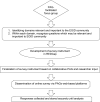Individuals affected by eosinophilic gastrointestinal disorders have complex unmet needs and frequently experience unique barriers to care
- PMID: 29615329
- PMCID: PMC6167209
- DOI: 10.1016/j.clinre.2018.03.003
Individuals affected by eosinophilic gastrointestinal disorders have complex unmet needs and frequently experience unique barriers to care
Abstract
Introduction: Eosinophilic gastrointestinal disorders (EGIDs) are a rare but emerging healthcare problem. Patient advocacy groups (PAGs) have an important role in representing the EGID community, and serve as valuable research partners. By leveraging the partnership between medical researchers and PAGs, we examined the unmet needs and barriers to care perceived by individuals affected by EGIDs. Next, we examined if these varied between adult EGID patients and adult caregivers of children with EGID.
Methods: Adult EGID patients and adult caregivers of children (<18 years) with EGIDs participated in this study. PAGs conducted focus groups comprised of individuals affected by EGIDs to identify domains and questions meaningful to the EGID community and this information was used to develop an online REDCap survey. The survey consisted of 58 questions across medical, healthcare, social, and emotional impact domains. It was distributed via the PAGs' web-based platforms. Demographic data, and responses to questions on a six-point Likert scale were collected and analyzed.
Results: Of the 361 responses analyzed, 90 (25%) were from adult EGID patients and 271 (75%) were from adult caregivers. Of the applicable responses, in the medical domain only 19% of participants indicated that repeated endoscopies to monitor response to treatment was convenient. In the healthcare domain, 67% indicated that lack of insurance coverage for elemental formula was a barrier. In the social domain, only 5% of respondents reported adequate awareness of EGIDs in schools. In the emotional domain, 64% had experienced significant stress due to EGID related out-of-pocket costs. Multivariate logistic regression revealed that some of these responses varied between adult EGID patients and adult caregivers of children with EGID. The respondents indicated highest priority for improvement in the medical domain compared to other domains.
Conclusions: Individuals affected by EGIDs have a constellation of complex unmet needs and perceived barriers across medical, healthcare, social and emotional domains. Addressing unmet needs in the medical domain is relatively more important for the EGID community. Understanding unmet needs and barriers will likely help design improved patient-centered EGID care paradigms.
Keywords: Eosinophilic esophagitis; Eosinophilic gastritis; Eosinophilic gastroenteritis; Eosinophilic gastrointestinal disorders; Health promotion; Health services research; Healthcare barriers; Rare diseases; Survey; Unmet needs.
Copyright © 2018 Elsevier Masson SAS. All rights reserved.
Conflict of interest statement
Competing interests
GSH: The author declares no competing interest
EK: The author declares no competing interest
MJS: The author declares no competing interest
MS: The author declares no competing interest
WB: The author declares no competing interest
CR: The author declares no competing interest
SK: The author declares no competing interest
DM: The author declares no competing interest
KS: The author declares no competing interest
PA: The author declares no competing interest
JS: The author declares no competing interest
SKG: The author declares no competing interest
GTF: No potential conflicts of interest related to this paper. Consultant for Banner and Shire.
MER: No potential conflicts of interest related to this paper. Consultant for NKT Therapeutics, Pulm One, Spoon Guru, Celgene, Shire, Astra Zeneca, GlaxoSmithKline, Allakos, and Novartis and has an equity interest in the first three listed and Immune Pharmaceuticals, and royalties from reslizumab (Teva Pharmaceuticals). M.E.R. is an inventor of patents, owned by Cincinnati Children’s.
ESD: No potential conflicts of interest related to this paper. Consultant for Adare, Alivio, Alkalso, Banner, Celgene/Receptos, Enumeral, GSK, Regeneron, Shire. Research funding from Adaire, Meritage, Miraca, Nutricia, Celegene/Receptos, Regeneron, Shire.
Figures
Comment in
-
Commentary: Individuals affected by Eosinophilic Gastrointestinal Disorders Have Complex Unmet Needs and Experience Barriers to Care.J Rare Dis Res Treat. 2018;3(2):34-36. doi: 10.29245/2572-9411/2018/2.1155. Epub 2018 Jul 17. J Rare Dis Res Treat. 2018. PMID: 30854530 Free PMC article. No abstract available.
References
Publication types
MeSH terms
Supplementary concepts
Grants and funding
LinkOut - more resources
Full Text Sources
Other Literature Sources
Medical



